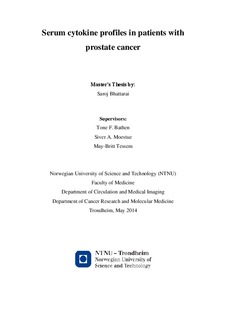| dc.description.abstract | Prostate cancer (PCa) is the most commonly diagnosed malignancy and the third leading cause of cancer death among men in western countries. The high incidence of prostate cancer underscores urgent need for clinical indicators (biomarkers) for early detection of the presence and progression of the disease. Emerging evidence suggest that cytokine, chemokine and growth factor are key mediators of prostate inflammation that may play an important role in prostate cancer initiation and progression and may facilitate the exploration of new markers of prostatic neoplasia and inflammation. Cytokine profiling in serum and plasma has become an important biomarker discovery tool in the study of disease mechanism, pathogenesis and treatment. The purpose of this Master thesis was to implement multiplex immunoassay that is capable of measuring multiple cytokines simultaneously within a single sample in order to study the differences of serum cytokine profile between patients with prostate PCa and non-cancer individuals to explore new biomarker of prostatic neoplasia. Concentrations of 27 cytokines (cytokines/chemokine’s and growth factor) were measured in sera of 29 patients with PCa and 21 non-cancer individuals using multiplex ELISA-based immunoassay. Relationships of these cytokine levels to serum PSA, Gleason score and urinePCA3 was also assessed. There was no significant difference in cytokine level between PCa and non-cancer controls. No correlation of cytokine and serum PSA level among non-cancer and whole cohort was observed. However, a significant positive correlation was found between serum levels of twenty different cytokines (IL-1β, IL-1ra, IL-2, IL-4, IL-6, IL-7, IL-9, IL-10, IL-12, IL-13, IL-17, Basic FGF, Eotaxin, G-CSF, GM-CSF, IFN-γ, MCP-1, PDGF-BB, TNF-α, and VEGF) and PSA levels among PCa patients. Interferon gamma-induced Protein 10 (IP-10) was only found to be associated with relationship with age, and no correlation of serum cytokine with Gleason score was found. Negative correlations between the expression levels of IL-2, GM-CSF, MIP1α and urine PCA3 was found before Benjamini and Hochberg multiple corrections. Except IP-10, MCP1, MIP1α, MIP1β, PDGF, the majority of cytokine shows strong correlations between each other.
In conclusion, though there was no significant difference in cytokine level between prostate and non-cancer individuals, however the work presented in this thesis shows strong correlation of PSA level with cytokine among PCa and no correlation among non-cancer individuals. This could lead to a better description of disease state and better understanding of the pathophysiology of PCa and may improve clinical management in patients with PCa. | nb_NO |
